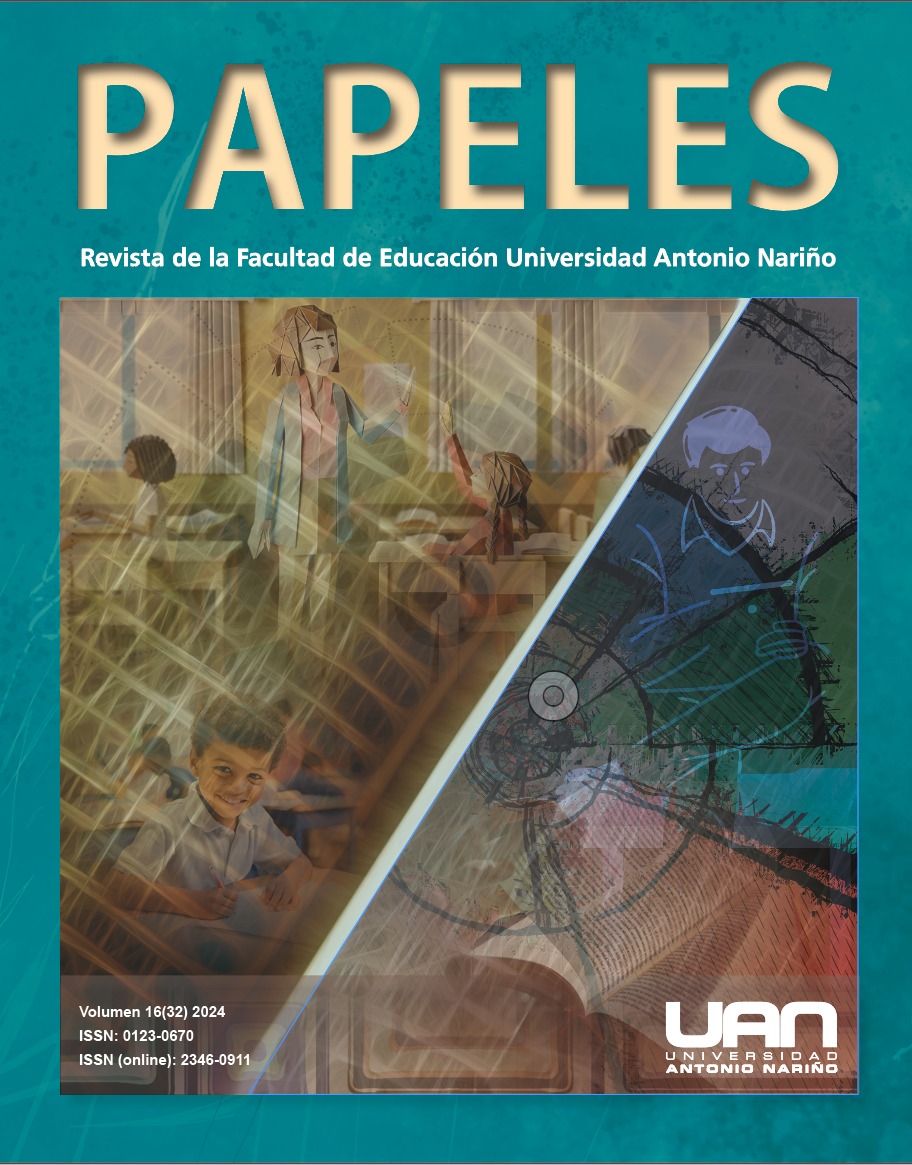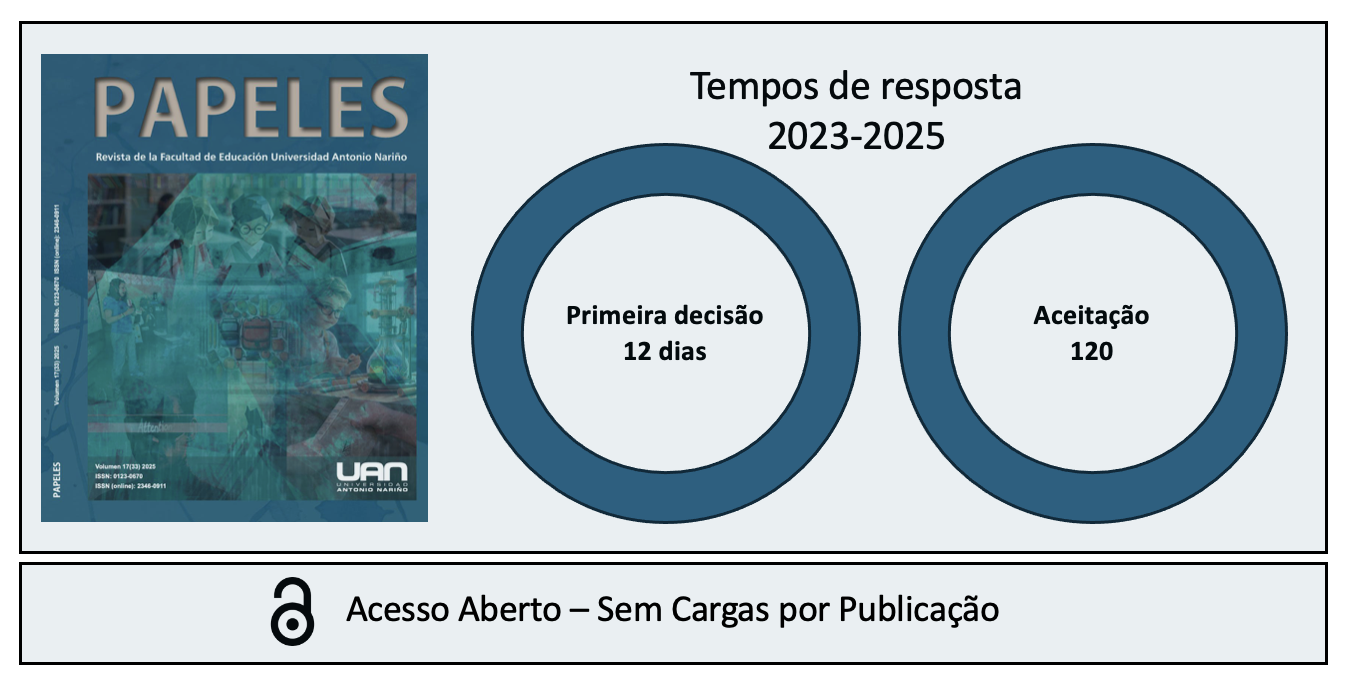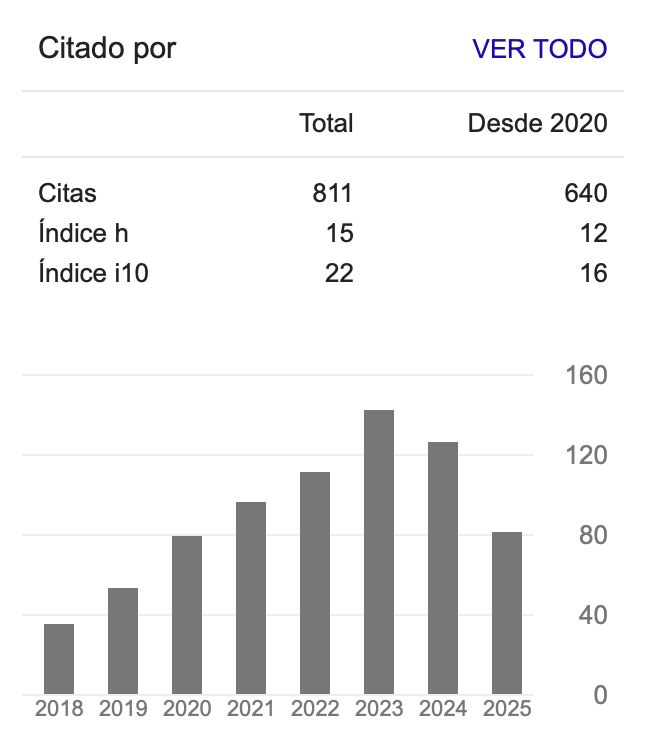Avaliação da melhoria da competência em consciência e expressão cultural através da aprendizagem baseada no jogo e na literatura em ILE no Ensino Secundário.
Avaliação da melhoria da competência em consciência e expressão cultural por meio da aprendizagem baseada em jogos e literatura
DOI:
https://doi.org/10.54104/papeles.v16n32.1971Palavras-chave:
Aprendizagem baseada em jogos, competência cultural, inglês como língua estrangeira, literatura, gênero de ficção investigativaResumo
Este estudo investiga a possível melhoria da competência-chave consciência cultural e expressão em inglês como língua estrangeira (EFL) através da aplicação de uma metodologia integrada de aprendizagem baseada em jogos (GBL) combinada com literatura. Utilizando uma abordagem de método misto, foi implementada uma sequência didática numa turma do 3.º ESO com 30 alunos. Os resultados indicam que a GBL e a literatura podem efetivamente promover competências-chave e aptidões básicas de EFL de uma forma envolvente e motivadora. Apesar do tempo limitado, os alunos demonstraram uma maior compreensão da cultura britânica e do subgénero dos romances policiais curtos, enquanto expandiam naturalmente o seu vocabulário e as suas competências gramaticais. Além disso, a maior motivação observada entre os alunos realça a importância da aprendizagem ativa. A investigação oferece valiosas perspectivas qualitativas e quantitativas para futuros estudos neste domínio.
Downloads
Referências
Bertinetti, P. (Ed.) (1995). Detective stories: Arthur Conan Doyle et al. Cideb Editrice.
Caleya Dalmau, M. F. de, Bobkina, J., & Sarto Martes, M.ª del P. (2012). The use of literature as an advanced technique for teaching English in the EFL/ESL classroom. Educación y Futuro: Revista de Investigación Aplicada y Experiencias Educativas, 27, 217-236. https://dialnet.unirioja.es/servlet/articulo?codigo=4060948
Chou, M. J. (2017). Board games play matters: A rethinking on children’s aesthetic experience and interpersonal understanding. Eurasia Journal of Mathematics, Science and Technology Education, 13(6), 2405-2421. https://doi.org/10.12973/eurasia.2017.01232a DOI: https://doi.org/10.12973/eurasia.2017.01232a
Colby, R. S. (2017). Game-based pedagogy in the writing classroom. Computers and Composition, 43, 55-72. https://doi.org/10.1016/j.compcom.2016.11.002 DOI: https://doi.org/10.1016/j.compcom.2016.11.002
Deardorff, D. K. (2006). Identification and assessment of intercultural competence as a student outcome of internationalization. Journal of Studies in International Education, 10(3), 241-266. https://doi.org/10.1177/1028315306287002 DOI: https://doi.org/10.1177/1028315306287002
Decreto 107/2022, de 5 de agosto, del Consell, por el que se establece la ordenación y el currículo de la Educación Secundaria Obligatoria. https://noticias.juridicas.com/base_datos/CCAA/735994-d-107-2022-de-5-ago-ca-valencian-establece-la-ordenacion-y-el-curriculo-de.html
Doyle, A. (1982) Silver Blaze. In P. Bertinetti (Ed.), Detective stories: Arthur Conan Doyle et al. Cideb Editrice.
Eden, C. A., Chisom, O. N., & Adeniyi, I. S. (2024). Cultural competence in education: Strategies for fostering inclusivity and diversity awareness. International Journal of Applied Research in Social Sciences, 6(3), 383-392. https://doi.org/10.51594/ijarss.v6i3.895 DOI: https://doi.org/10.51594/ijarss.v6i3.895
Federación de Gremios de Editores de España. (2023). Informe sobre el sector editorial español: Año 2022. https://www.federacioneditores.org/img/documentos/Informe_sector_editorial_esp2022.pdf
Ford, B. A., Stuart, D. H., & Vakil, S. (2014). Culturally responsive teaching in the 21st century inclusive classroom. Journal of the International Association of Special Education, 15(2), 56-62.
García Vaquero, A. F., & Alcantud Díaz, M. (2023). Exploring Tolkien’s literary universe in the EFL classroom: Ap-proaching Literature through robotics-enhanced inquiry-based learning. Digital Education Review, 44, 1-12. https://doi.org/10.1344/der.2023.44.1-12 DOI: https://doi.org/10.1344/der.2023.44.1-12
George, A. S., George, A. H., Baskar, T., & Shahul, A. (2023). Screens steal time: How excessive screen use impacts the lives of young people. Partners Universal Innovative Research Publication, 1(2), 157-177. https://doi.org/10.5281/zenodo.10250536
Getahun, E. (2022). Are attention spans decreasing? The Student Movement, 104(9). https://www.andrews.edu/life/student-movement/issues/2022-02-25/ideas-are-attention-spans-decreasing-.html
Ghazal, S., & Singh, S. (2016). Game-based language learning: Activities for ESL classes with limited access to technology. ELT Voices, 6(4), 1-8.
Gower, R. (1986). Can stylistic analysis help the EFL learner to read literature? Elt Journal, 40(2), 125-130. https://doi.org/10.1093/elt/40.2.125 DOI: https://doi.org/10.1093/elt/40.2.125
Hilt, J. A. (2019). Dependencia del celular, hábitos y actitudes hacia la lectura y su relación con el rendimiento académico. Apuntes Universitarios, 9(3), 103-116. https://doi.org/10.17162/au.v9i3.384 DOI: https://doi.org/10.17162/au.v9i3.384
Isaacs, S. (2015). The difference between gamification and game-based learning. Association for Supervision and Curriculum Development.
Jargon, J. (2022, April 2). TikTok brain explained: Why some kids seem hooked on social video feeds. WSJ. https://www.wsj.com/articles/tiktok-brain-explained-why-some-kids-seem-hooked-on-social-video-feeds-11648866192
Johnson, T. (n.d.). Gamification versus game-based learning. Laureate Network Office. HBO Toolkit.
Johnston, O., Wildy, H., & Shand, J. (2023). Teenagers learn through play too: Communicating high expectations through a playful learning approach. The Australian Educational Researcher, 50(3), 921-940. https://doi.org/10.1007/s13384-022-00534-3 DOI: https://doi.org/10.1007/s13384-022-00534-3
Khatib, M., Rezaei, S., & Derakhshan, A. (2011). Literature in EFL/ESL classroom. English Language Teaching, 4(1), 201-208. https://files.eric.ed.gov/fulltext/EJ1080411.pdf DOI: https://doi.org/10.5539/elt.v4n1p201
Kourova, A., & Modianos, D. (2013). Inter-cultural awareness and its role in enriching students’ communicative competence. The International HETL Review, 2013, 60-70. https://www.hetl.org/wp-content/uploads/2013/09/HETLReview2013SpecialIssueArticle6.pdf
Maroudi, K. M. (2022). Introducing young adult literature in the EFL [doctoral dissertation, Aristotle University of Thessaloniki]. https://ikee.lib.auth.gr/record/340756/files/GRI-2022-36049.pdf
Márquez-Gómez, A., & Alcantud-Díaz, M. (2019). Gamification or the ludic expectations of literacy. Filoteknos, 9. https://cejsh.icm.edu.pl/cejsh/element/bwmeta1.element.desklight-63a8c191-50f7-4c4f-969a-11a3aab5bad8
McKay, S. (2001). Literature as content for ESL/EFL. In M. Celce-Murcia (Ed.), Teaching english as a second or foreign language (3rd, pp. 319-332). Heinle & Heinle.
Mikasyte, V. (2018). Gamified EFL instructions: An overview of the most recent research trends. In Proceedings of the IVUS International Conference on Information Technology (vol. 712). https://ceur-ws.org/Vol-2145/p02.pdf
Papastergiou, M. (2009). Digital game-based learning in high school computer science education: Impact on educational effectiveness and student motivation. Computers & Education, 52(1), 1-12. https://doi.org/10.1016/j.compedu.2008.06.004 DOI: https://doi.org/10.1016/j.compedu.2008.06.004
Pinar-Pérez, J. M., Morales-Arsenal, R., Fernández-Moya, M., Cuadros-Solas, P., & Salvador, C. (2021, February). Mitigating deficiencies of generation Z through new educational methodologies in a business statistic course. In Proceedings INNODOCT/20. International Conference on Innovation, Documentation, and Education (pp. 81-88). Universitat Politècnica de València. https://doi.org/10.4995/INN2020.2020.11821 DOI: https://doi.org/10.4995/INN2020.2020.11821
Recio, O. (2007). Jueducación en el aula: El valor didáctico de los juegos. https://proyectoscprgijon.es/gamificacion/wp-content/uploads/recursos/Oscar%20Recio%20-%20Los%20juegos%20en%20el%20aula.pdf
Reyes-Torres, A., Villacañas-de-Castro, L. S., & Pardo, B. S. (Eds.). (2014). Thinking through children’s literature in the classroom. Cambridge Scholars Publishing.
Soler Pardo, B., & Alcantud Díaz, M. (2020). A SWOT analysis of the communicative English language skills improvement programme: A tool for autonomous EFL learning. Complutense Journal of English Studies, 28(19), 109-120. https://dx.doi.org/10.5209/cjes.63845 DOI: https://doi.org/10.5209/cjes.63845
Vromans, P., Korzilius, H., Bücker, J., & de Jong, E. (2023). Intercultural learning in the classroom: Facilitators and challenges of the learning process. International Journal of Intercultural Relations, 97, 101907. https://doi.org/10.1016/j.ijintrel.2023.101907 DOI: https://doi.org/10.1016/j.ijintrel.2023.101907
Vygotsky, L. (1966). Igra i ee rol v umstvennom razvitii rebenka, Voprosy psihologii. Problems of Psychology, 12(6), 62-76.
Xyst, K. (2016). Constructivism, dewey, and academic advising. NACADA Journal, 36(2), 11-19. https://doi.org/10.12930/NACADA-14-027 DOI: https://doi.org/10.12930/NACADA-14-027
Downloads
Publicado
-
Resumo392
-
PDF 138
-
LENS 15
-
XML 31
Como Citar
Edição
Seção
Categorias
Licença
Copyright (c) 2024 María Alcantud-Díaz; Isabella Monello Álvarez

Este trabalho está licenciado sob uma licença Creative Commons Attribution-NoDerivatives 4.0 International License.






